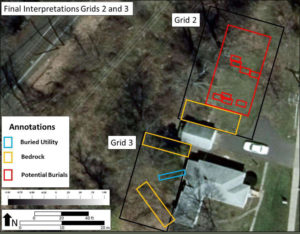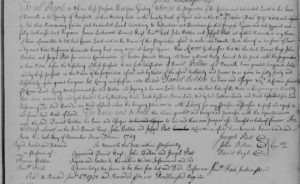Wilton’s Lost Colonial-era Spruce Bank Black Cemetery Found
Location of Eight Burials Confirmed
Wilton Historical Society announces that the location of historic Spruce Bank Cemetery, a burial ground for enslaved and free Blacks in Wilton, has been discovered through extensive research and the results of a ground penetrating radar survey that revealed eight burials within the surveyed area on the site. Located at 331 Danbury Road, the Spruce Bank Cemetery portion of the property will be protected from development in order to respect the dignity of those reposing in the sacred ground.
The location of Spruce Bank Cemetery is a significant finding which documents a key piece of the town’s history and pinpoints the resting places of some of Wilton’s most marginalized residents. Found at the northern end of 331 Danbury Road, the original quarter-acre reserved for the cemetery was first encroached on by the arrival of the railroad in 1852, and then the expansion and rerouting of old Danbury Road, now Route 7. The last documented burial at Spruce Bank was in the late 1870s. Sometime afterwards the fieldstone markers were vandalized and removed. Without visible evidence at the surface – and despite historians searching for it in the 1890s, 1940s, and 1990s – memory of the exact location was lost.

Dr. David Leslie of TerraSearch Geophysical conducted a ground penetrating radar (GPR) survey of four different search areas on the property during the summer of 2023. The data collected by Dr. Leslie indicated that there was evidence of at least eight burials at the northern end of the property.
Nick Foster, Executive Director of the Wilton Historical Society, said “Over the past five years, the WHS has been quite focused on bringing to light the history of enslaved and free black people in Wilton. The Spruce Bank Cemetery location was tantalizingly elusive – and we became fixated on finding it. Once Dr. Julie Hughes’ in-depth deed and mapping research led us to the most likely spot, we were able to obtain a grant from the State Historic Preservation Office (SHPO) of the Department of Economic and Community Development for a non-invasive Ground Penetrating Radar (GPR) survey to see if any unmarked burials were present and identifiable. Archaeologist Dr. David Leslie of TerraSearch Geophysical conducted the testing and determined there were eight burials.”
According to Dr. Julie Hughes, Archivist at the Wilton History Room and a Trustee at Wilton Historical Society, Spruce Bank Cemetery pre-dates 1749, when the Proprietors of Norwalk deeded a part of the commons to Daniel Belden for a mill site, while reserving the sanctity of the African American burial ground included in the parcel. Hughes said: “My research convinced SHPO to alert Wilton’s Planning & Zoning Department, which promptly ordered that no new development would be permitted at the site until proper forensics were conducted and a clearer understanding of the matter was obtained. This gave us time to prove the cemetery was real. Now we can properly commemorate the people buried here who gave so much to Wilton and got so little in return. We all feel such a deep sense of responsibility and so much joy that they are finally safe and will remain protected under Connecticut State law.”

This passage, recorded in the Town of Norwalk Land Records, is the first known written evidence of Spruce Bank Cemetery. It documents when the Proprietors of Norwalk deeded a part of the commons to Daniel Belden for a mill site, but stipulated that access to the burial ground must remain, “reserving with in said bounds one rood of land where the burying place now is”
Working together and committed to memorializing those buried here, a Task Force including local members of Black and African-American community groups and religious leaders is being assembled and will meet in the near future to discuss next steps in memorializing the site and outlining educational outreach plans.
Founded in 1938, the Wilton Historical Society’s mission is to preserve Wilton’s history, and connect, engage and educate all who would look to the past to shape the future. For more information on the history of African Americans in Wilton, please visit Finding the Forgotten: Resources for Wilton’s Black History